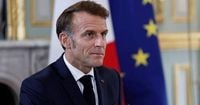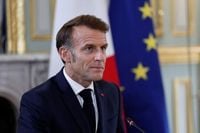The diplomatic standoff over Iran’s nuclear program reached a fever pitch this week, as European officials declared that Tehran had not yet taken the necessary steps to avert the reimposition of United Nations sanctions—a process known as the “snapback” mechanism. With the deadline looming at the end of September 2025, the pressure is mounting on all sides, and the prospect of renewed sanctions threatens to further destabilize an already volatile Middle East.
On September 17, 2025, the German Foreign Ministry and the European Union sounded the alarm following a tense call with Iranian officials and representatives from France, Germany, the United Kingdom, and the EU’s top diplomat, Kaja Kallas. According to reporting by The Associated Press, Kallas didn’t mince words: “The window for finding a diplomatic solution on Iran’s nuclear issue is closing really fast.” She urged Iran to “show credible steps towards addressing the demands of France, [the] U.K. and Germany, and this means demonstrating full cooperation with the International Atomic Energy Agency and allowing inspections of all nuclear sites without delay.”
The message was echoed by the German Foreign Ministry, which wrote on social platform X that “Iran has yet to take the reasonable and precise actions necessary to” stop the reimposition of U.N. sanctions. The European powers—collectively known as the E3—have made it clear that the ball is in Iran’s court. Their offer: delay sanctions for up to six months, provided Iran restores access for U.N. nuclear inspectors and engages in negotiations with the United States.
But so far, Iran has not budged. Iranian Foreign Minister Abbas Araghchi, in a statement issued hours after the European warnings, insisted that the snapback of U.N. sanctions was “lacking any legal or logical justification.” Araghchi pointed to a deal, mediated by Egypt, that would allow the International Atomic Energy Agency (IAEA) access to all Iranian nuclear sites and require Tehran to report on the whereabouts of all its nuclear material. However, as The Associated Press noted, it remains unclear when Iran will actually deliver that report. Araghchi offered little in terms of concrete steps to address European concerns, instead challenging the other parties to “seize this opportunity to keep the diplomatic path open and avert an avoidable crisis, showing seriousness and belief in diplomacy.”
The stakes couldn’t be higher. The snapback mechanism, built into the 2015 nuclear deal between Iran and world powers, was designed to be veto-proof at the U.N. Security Council. If no diplomatic breakthrough is reached, the snapback will take effect at the end of September 2025, reimposing a slew of punishing sanctions on Iran. These measures would freeze Iranian assets abroad, halt arms deals with Tehran, and penalize any development of Iran’s ballistic missile program—further squeezing an economy already battered by years of isolation and internal strife.
France’s President Emmanuel Macron, speaking to Israel’s Channel 12 on September 18, 2025, was blunt in his assessment: “Yes. I think so because the latest news from the Iranians is not serious.” Macron’s comments, reported by Reuters, reflect a growing frustration among European leaders who have spent months trying to salvage what remains of the 2015 nuclear agreement.
The E3’s patience is wearing thin. At the end of August, Britain, France, and Germany launched a 30-day process to reimpose U.N. sanctions, setting a series of conditions for Tehran to meet during September. Their offer to delay the snapback for up to six months hinges on Iran’s willingness to restore full access for U.N. nuclear inspectors and engage in meaningful talks with Washington. Yet, as the latest round of talks on September 17 failed to yield substantial progress, the door to diplomacy appears to be closing fast.
Meanwhile, the 15-member U.N. Security Council is set to vote on September 19, 2025, on a resolution that would permanently lift U.N. sanctions on Iran—a move required after the E3 triggered the snapback process. But diplomats widely expect the resolution to fail to garner the minimum nine votes needed to pass, and even if it did, it would almost certainly be vetoed by the United States, Britain, or France. The likelihood of a diplomatic breakthrough before the deadline seems, at best, remote.
The nuclear standoff is playing out against a backdrop of heightened regional instability. This past June, a 12-day war erupted between Israel and Iran, with both Israeli and American forces bombing Iranian nuclear sites. The strikes raised fresh questions about the status of Tehran’s uranium stockpile, which is believed to be enriched nearly to weapons-grade levels. The attacks—and the uncertainty surrounding Iran’s nuclear materials—have only deepened international concerns and added urgency to the diplomatic push.
Further complicating matters is the ongoing conflict in Gaza, where Israel’s ground offensive against Hamas in Gaza City continues to escalate. The prospect of renewed U.N. sanctions on Iran threatens to inflame tensions not only between Tehran and the West but also across a region already reeling from war and political upheaval. As The Associated Press observed, invoking the snapback could “heighten tensions between Iran and the West in a region still burning over the Israel-Hamas war in the Gaza Strip.”
For Iran, the economic consequences of renewed sanctions would be severe. The snapback would freeze billions in Iranian assets held overseas, choke off vital arms deals, and further restrict the country’s ability to develop its ballistic missile program. These measures come at a time when Iran’s economy is already under intense strain, with inflation soaring and access to international markets sharply limited.
Yet, despite the mounting pressure, Iran’s leadership remains defiant. Foreign Minister Araghchi has consistently argued that the sanctions lack both legal and logical justification. He maintains that Iran has shown flexibility by agreeing to allow IAEA access to its nuclear sites, albeit through a deal mediated by Egypt. Still, the Europeans and Americans remain unconvinced, demanding not just promises but verifiable action—particularly in light of the recent military strikes and the ongoing enrichment of uranium.
With the deadline for snapback sanctions fast approaching, the world is watching to see whether a last-minute diplomatic breakthrough is possible. The outcome will have far-reaching implications—not only for Iran and the West but for the broader stability of the Middle East. As the clock ticks down, the stakes continue to rise, and the window for diplomacy grows ever narrower.
Whether the coming days bring a breakthrough or a breakdown, one thing is clear: the fate of Iran’s nuclear program, and the region’s fragile peace, hangs in the balance.



